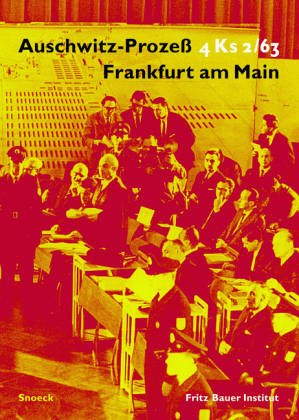
Auschwitz-Prozess 4 ks 2/63
Sunday to Thursday: 09:00-17:00
Fridays and Holiday eves: 09:00-14:00
Yad Vashem is closed on Saturdays and all Jewish Holidays.
Entrance to the Holocaust History Museum is not permitted for children under the age of 10. Babies in strollers or carriers will not be permitted to enter.

Auschwitz-Prozess 4 ks 2/63
Auschwitz-Prozess 4 ks 2/63
Edited by Irmtrud Wojak and the Fritz Bauer Institut Staff
Fritz Bauer Institut, 2005
872 pages
This is one of the heaviest books (in terms of sheer weight) on the Holocaust that has appeared in the last decade. Yet any effort invested in reading it (and carrying it) is well worthwhile. This volume, published concurrently with the ongoing historical exhibition in German cities marking 40 years since the Frankfurt Trials (1963-1965), is a treasure trove of information on Auschwitz, the Jewish and non-Jewish victims, the German perpetrators, and their collaborators.
Anything you have ever wanted to know about the Auschwitz Trials, the history of the camp, its structure, functioning, and organization can be found in this book. Much effort has obviously been invested in all facets of its preparation: research, assembly of artifacts and historical documents, design, and printing. The editing job is superb; there are virtually no printing or linguistic errors.
The book stresses the historical importance of the Auschwitz criminals' trials, unofficially named the "Frankfurt Trials", conducted in Germany in the 1960's. As a result of these trials, German society was confronted for the first time with German crimes carried out against Jews and others in the Auschwitz-Birkenau extermination camp. They now faced hundreds of personal testimonies relating to German atrocities: abuse, unbounded violence, humiliations, sadism, barbarism, and finally ruthless murder. The Frankfurt Trials fundamentally shifted the attitude of the German public towards Nazi atrocities and greatly increased awareness of the brutal history of Auschwitz-Birkenau.
The book is a valuable resource for anyone who wishes to deepen his or her knowledge of the trials. It also stands as a tribute to Dr. Fritz Bauer, District Attorney in Hesse, without whose insistence, perseverance, and bravery, these trials would never have had taken place.

Thank you for registering to receive information from Yad Vashem.
You will receive periodic updates regarding recent events, publications and new initiatives.

"The work of Yad Vashem is critical and necessary to remind the world of the consequences of hate"
Paul Daly
#GivingTuesday
Donate to Educate Against Hate


Worldwide antisemitism is on the rise.
At Yad Vashem, we strive to make the world a better place by combating antisemitism through teacher training, international lectures and workshops and online courses.
We need you to partner with us in this vital mission to #EducateAgainstHate
The good news:
The Yad Vashem website had recently undergone a major upgrade!
The less good news:
The page you are looking for has apparently been moved.
We are therefore redirecting you to what we hope will be a useful landing page.
For any questions/clarifications/problems, please contact: webmaster@yadvashem.org.il
Press the X button to continue



